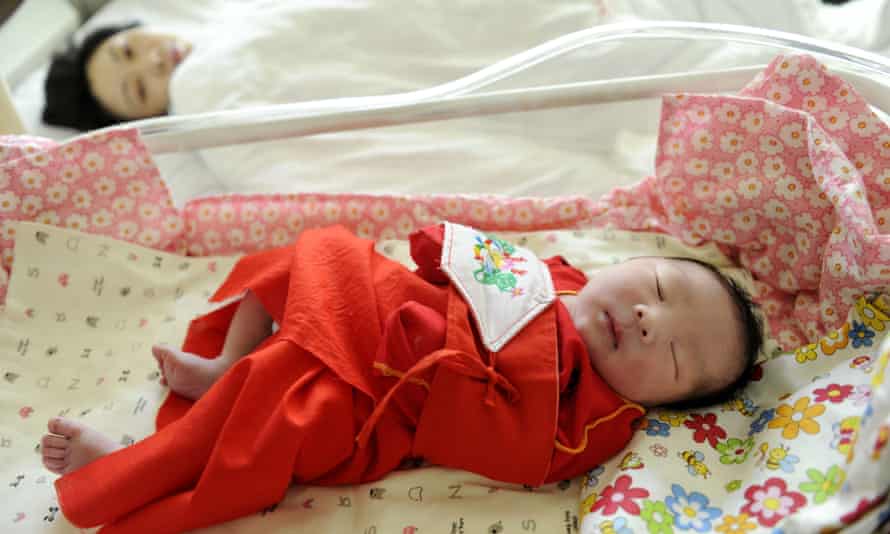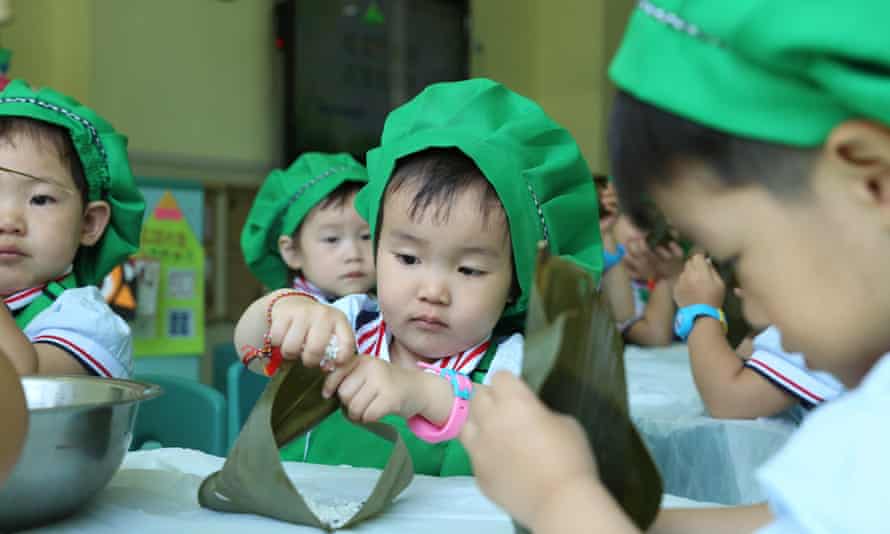What Happens if a Family Has More Than One Child in China
F or Xu Meiru, 38, the idea of having a second child is exhausting. Her days typically begin at 5am, don't stop until 11pm, and are filled with shuttling her nine-year-old son to schoolhouse, helping him with his homework, preparing meals and running an online clothing business concern.
"It'due south hard to observe time even to sleep for a few minutes in a chair," she says, sitting in a McDonald's while her son plays a game on a phone, the detritus of a Happy Repast in front end of him.
Most tiring is the abiding worry over whether she is doing enough to assist him get ahead. He goes to music lessons, taekwondo classes and actress English tutoring. She spends the outset week of every summer and wintertime pause helping him ready for the next term. Sometimes her son's workload is so heavy that Xu does his assignments for him, using her left hand to brand her writing more childlike.
"At that place are besides many children and the contest is too high. If you lot don't do well in school you can't get into a good university, and then maybe you can't get a good job in the future," she says. She is visibly broken-hearted when discussing the prospect of a second child, something that until 3 years ago would have been forbidden nether Chinese law. "If we were to have another child, I'1000 afraid I wouldn't take the energy for them," Xu says.
Faced with a population that is shrinking and ageing, Chinese policymakers are attempting to engineer a babe blast later on more than 3 decades of a Malthusian family unit planning regime better-known every bit the one-child policy. Central policy planners accept loosened restrictions on family sizes, and now all married couples can have two children. There is talk of the limits being dropped altogether, and amidst aggressive propaganda drives, local officials are experimenting with subsidies and incentives for parents.
But these efforts announced to be too trivial too late. Birthrates have fallen and are probable to keep to driblet as parents like Xu determine against having more children. More immature women are pushing dorsum against state propaganda and family unit pressure, while improving didactics standards and income levels take delayed marriage and childbirth. Moreover, decades of the 1-child policy have made unmarried-child households the norm, experts say.
"China should have stopped the policy 28 years agone. Now it's too tardily," says Yi Fuxian, a senior scientist at the University of Wisconsin in Madison and a longtime critic of the family planning policies.
Demographers warn that China's population will begin to shrink in the adjacent decade, potentially derailing the earth's 2d-largest economy, with a far-reaching global impact. Mainland china'due south birthrate concluding year was at its everyman since the founding of the People's Republic in 1949, with 15.23 meg births, dramatically lower than the 21-23 1000000 officials had expected.
By 2050 as much as a third of the country'south population will exist made upwardly of people over the age of 60, putting severe strain on country services and the children who bear the burden of caring for elderly relatives.
Nowhere is this trend more obvious than in China's rust belt, the northward-eastern region better-known every bit Dongbei which has the lowest birthrates in the state, the result of strict enforcement of family planning limits and the region's early evolution. For residents in Shenyang, the largest city in Dongbei, in fundamental Liaoning province, it's obvious why few families are willing to take more than children – the economy.
Rich in resource such as iron ore and coal, Dongbei was at the heart of the land's heavy industry between the 1950s and 1970s. During the reform era, industries moved due south to the coastal regions, and the state-run companies that employed most Dongbei workers have struggled, causing a mass exodus to other parts of Communist china.
"Shanghai, Guangzhou, all these cities are moving forward, simply Shenyang has stayed in place. All the high-rises don't change anything," says Zhang Yang, 36, who works in purchasing for a local state-owned visitor. "Few people are having babies because the economy is and then bad."
During Dongbei's heyday, Shenyang was the region's economic hub, with blocks of factories lining its principal street. Now those buildings have been replaced by loftier-ascension apartments, banks and hotels while the factories have been relocated to a suburb outside the city. The new economical zone, the new home for these factories, is tranquillity.
Workers in grey jumpsuits walk along the route just before noon. A sign on a taxi calls on Shenyang residents "to fight" for the rejuvenation of their city. Neighbourhoods in the sometime industrial sector are being torn down to make way for new buildings.
The birthrate here is specially depression, at 8.79 per 1,000 women, compared with the national boilerplate of 12.43 in 2017. The city is ageing quickly – a quarter of residents were above the historic period of threescore in 2017, and local population experts believe the urban center will soon overtake Shanghai to accept China's oldest populace.
Dongbei's struggling economy is the main reason Zhang and his wife take decided not to have another child. He has not had a wage increase in 3 years. When his son goes to kindergarten in a few years, he expects about half of his income volition get toward his schooling and extra classes and activities.
His hope is that his son will go to university in the south of China and pursue a career and life there. "It'south not that I'm worried about Liaoning's future. I have no promise for it at all," Zhang says.
Birthrates in Dongbei, home to about 109 meg people, have fallen steeply. The average number of children per adult female was 0.9 in 2000 and 0.56 in 2015, according to Yi. That means the next generation will be a quarter of the size of the last one.

Last summer, Liaoning released a Population Evolution Plan, vowing to enhance the province's birthrate past "working hard to create adept public opinion about having two children". Officials promised to explore subsidies for families with two children, encourage employers to offer more services for families, and support women returning to work afterward giving birth.
While parents in Shenyang say they have noticed an increment in nursing facilities at shopping centres and other public spaces, they have all the same to see whatever substantial support from the government. "For all these years, in that location haven't been any policies to help. Regime pledges like these are like thunder without raindrops. This is similar lying to a little kid," Zhang says.
Dongbei offers an example of what is to come for the rest of the land. As an early industrial hub, the province urbanised chop-chop, with incomes and instruction levels several years ahead of the national boilerplate – factors that act every bit natural constraints on the birthrate, according to experts. As other parts of the state go through similar stages of urbanisation and economic growth, they are going through comparable declines.
"This is not merely Dongbei but the whole country. Yous know what they say in economics: development is the best birth control," says Vocal Limin of the Population Research Found at Liaoning Academy.
Researchers believe the national rate of births could autumn farther. Last year'south low rate surprised many. Liang Jianzhang, a professor of economics at Peking University, says he and his colleagues had expected births to top in 2017 and begin falling after 2018.
"That peak plainly arrived in 2016, with births dropping ever since … What we tin can expect now is that the number of newborns will keep to shrink rapidly in 2019 and beyond," he wrote in an editorial in January.
"Information technology can be said with certainty that even though 2018 saw a low number of births, that number will non be surpassed for the adjacent 100 years. Red china will never see more than fifteen million newborns in the future," he predicted.
Local governments across Red china are struggling to reverse the declines with subsidies, propaganda initiatives and new regulations on workplace leave. In Xiantao, Hubei province, hospitals have offered to cover the costs of childbirth likewise as requite a 500 yuan (£sixty) subsidy for the offset kid and another 700 for the second. In Changsha, in southern China, an ad campaign concluding year listed "ane,001 reasons to have a babe". Between 2016 and 2017, near all provinces extended maternity go out.

Some worry that such measures will turn coercive, with the authorities deploying an all-encompassing family unit planning apparatus to encourage births. Officials once restricted population size through heavy fines, forced abortions and sterilisations.
"There is a danger that the authorities sees that what it has tried so far has failed, and it has to become more than coercive. There's a long history in population planning of extreme compulsion. There is no question that the regime could adopt coercive measures," says Leta Hong Fincher, author of Betraying Large Blood brother: The Feminist Awakening in Cathay.
Critics say that less invasive but still castigating measures would probably emerge gradually at local level under the guise of other causes such as preventing sexual practice-selective abortions. Several provinces have banned abortions after xiv weeks, and Jiangxi province in the south requires the signature of three medical professionals before the process tin can be performed. More provinces have put in place obstacles to getting divorces, including a test or mandated cooling-off period.
Regime language has alarmed people. Last year an article in the state-run People's Daily said: "The nascency of a babe is not but a thing of the family itself but likewise a country matter." In August, an economic science professor from Nanjing University wrote an editorial proposing a "nativity fund" that citizens contribute to, then cash in when they have children. Those who don't have children would get the money when they retire.
One internet user wrote: "When you lot don't want children, you force people to get sterilised. When you want more, you urge the states to requite birth. What exercise yous think I am?"
For now efforts have focused on cajoling women into have more children for the adept of the country. The All Communist china Women'due south Federation, a regime-affiliated organisation, has been running a "beautiful families" entrada, praising women who serve as primary caretakers of their parents and children.
"The party state sees the failing population as a real trouble, and information technology's women'south duty to answer to that," says Jane Golley, an acquaintance professor at Australian National University, who focuses on the Chinese economy and labour economics. "Information technology's a new era of control over women's reproductive choices."
Nonetheless more women are resisting government and societal force per unit area, and officials are waking up to their concerns. China'southward education and human resources ministries have ordered employers to cease asking female person applicants about their marital status and plans for children, a mutual practise.
Ye Liu, a sociologist and lecturer in international development at King's College London, has been interviewing Chinese women in their late 30s. When the two-child policy was introduced in 2016, well-nigh of her respondents were in what should have been the "second spring" of their careers, with the raising of their first child already behind them, with seniority and more bargaining ability at work. Many were devastated rather than overjoyed by the new policy.
"They are forever a liability for their employers considering they might have a 2nd kid," Ye says. A third of her respondents said they did non want another child, preferring to focus on their career. "They feel like they were experiments of the state. They were the experiments [nether the i-child policy] and now they are another experiment. They feel like they are forever beingness used by the country laboratory," Ye says.

Public resentment is 1 reason why policymakers did non stop the policy sooner. Co-ordinate to Yi Fuxian, the Wisconsin academic, Cathay could accept completely scrapped population controls in 1980 and growth would have moderated naturally. But family unit planners relied on overinflated schoolhouse enrolment and overreported births past hospitals, individuals and local governments. "Why did we follow such a wrong policy for so long? The Chinese authorities doesn't desire to admit it's wrong. It says the policy was right but now is the time to change. If it just says the policy was wrong, the public will become aroused," he says.
Living in a city with some of the lowest birthrates, Shenyang residents announced surprisingly focused on children. Groups of parents and grandparents tote small children around shopping centres filled with playgrounds and stores advertising toys and educational games. Parents depict the range of activities they tin can choose from: sensory classes for babies, babe pond classes, taekwondo, Chinese calligraphy, English tutoring or drawing.
The Dunnan Truthful Love Centre in central Shenyang offers high-end convalescence for mothers recuperating subsequently childbirth, a Chinese tradition known as "sitting the month".This is part of a focus on "quality over quantity", where families invest all their resources into one child, says Wang Libo, an practiced on population at Shenyang Normal Academy. Of the 500 clients the eye received terminal year, only iii accept had a second kid, as far as they know. But they expect business organization to be brisk this twelvemonth: the year of the sus scrofa in the Chinese calendar is associated with luck and wealth and thus an auspicious year to exist born.
For many families, the pressure to aid their kid compete is the chief reason for having just the one. Xu sends her son to extra tutoring and lessons just worries that he is nether too much pressure. She has read articles about children, pushed too hard by their parents, who have killed themselves or run away from dwelling. She tries to notice a place in his schedule for some costless time, and buys him all the comics and books that he wants. Still, when he performs a trivial worse on a exam or assignment, she grows anxious once again. "You can't help but wonder: what if I pushed him to study for just x more minutes?"
Source: https://www.theguardian.com/world/2019/mar/02/china-population-control-two-child-policy
0 Response to "What Happens if a Family Has More Than One Child in China"
Post a Comment